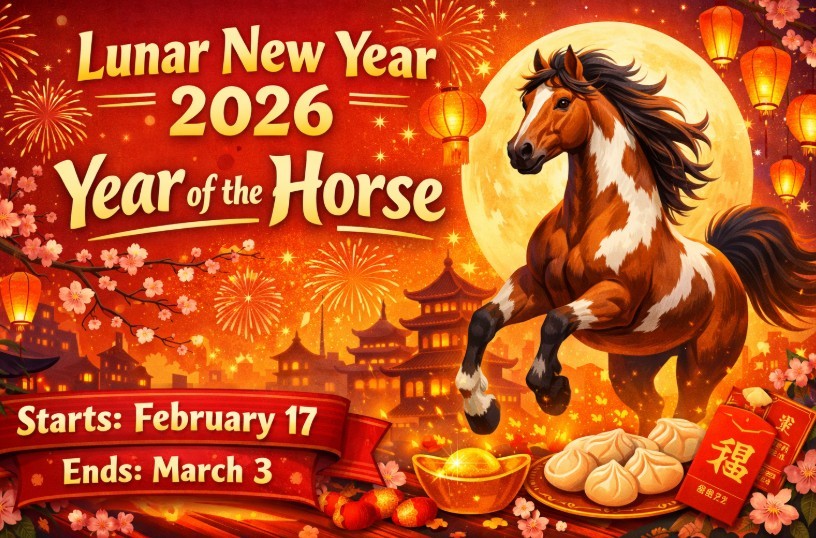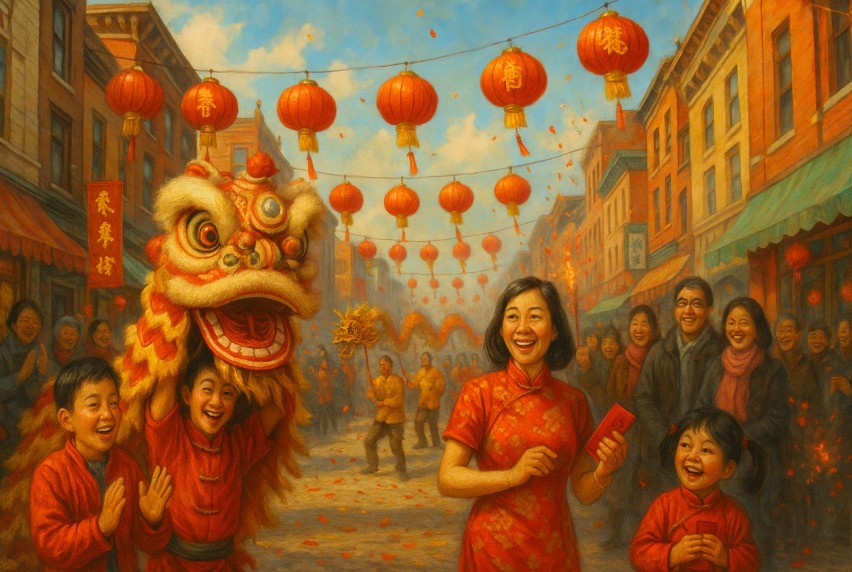How to Celebrate Chinese New Year: Traditions, Customs and Taboos
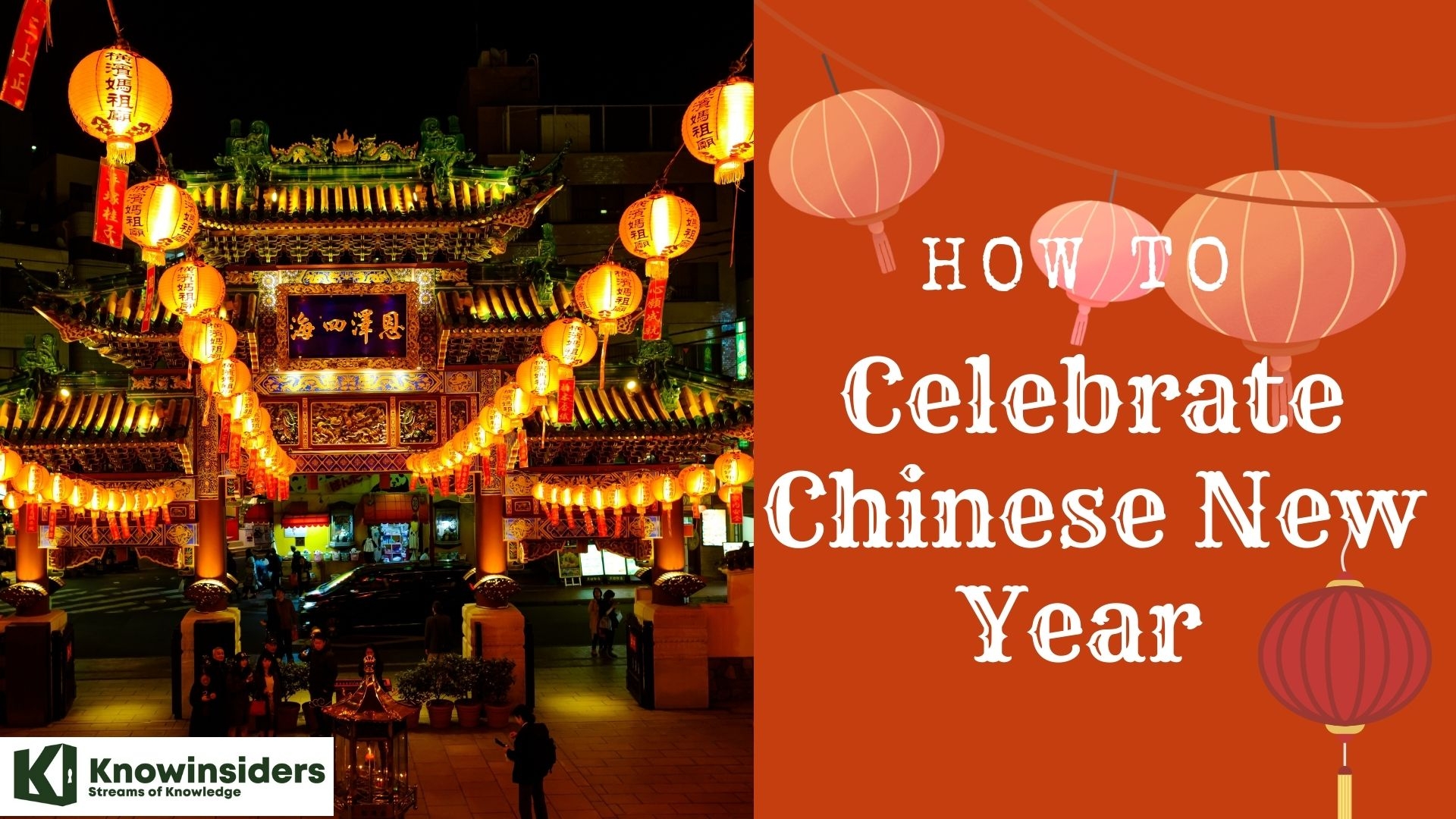 |
| How to celebrate Chinese New Year |
Chinese New Year, also called Lunar New Year, an annual 15-day festival in China and Chinese communities around the world that begins with the new moon that occurs sometime between January 21 and February 20 according to Western calendars. Festivities last until the following full moon. Chinese New Year occurs on Tuesday, February 1, 2022, in many of the countries that celebrate it.
Chinese New Year is one of the most important holidays in China, and has strongly influenced Lunar New Year celebrations such as the Losar of Tibet, and of China's neighbouring cultures, including the Korean New Year (Korean: 설날, seollal), and the Tet of Vietnam. It is also celebrated worldwide in regions and countries that house significant Overseas Chinese or Sinophone populations, including Taiwan, Singapore, Indonesia, Malaysia, Myanmar, Thailand, Cambodia, the Philippines, the United States, Mauritius, as well as in Canada and Europe.
Here is how to celebrate a Chinese New Year.
History of Chinese New Year
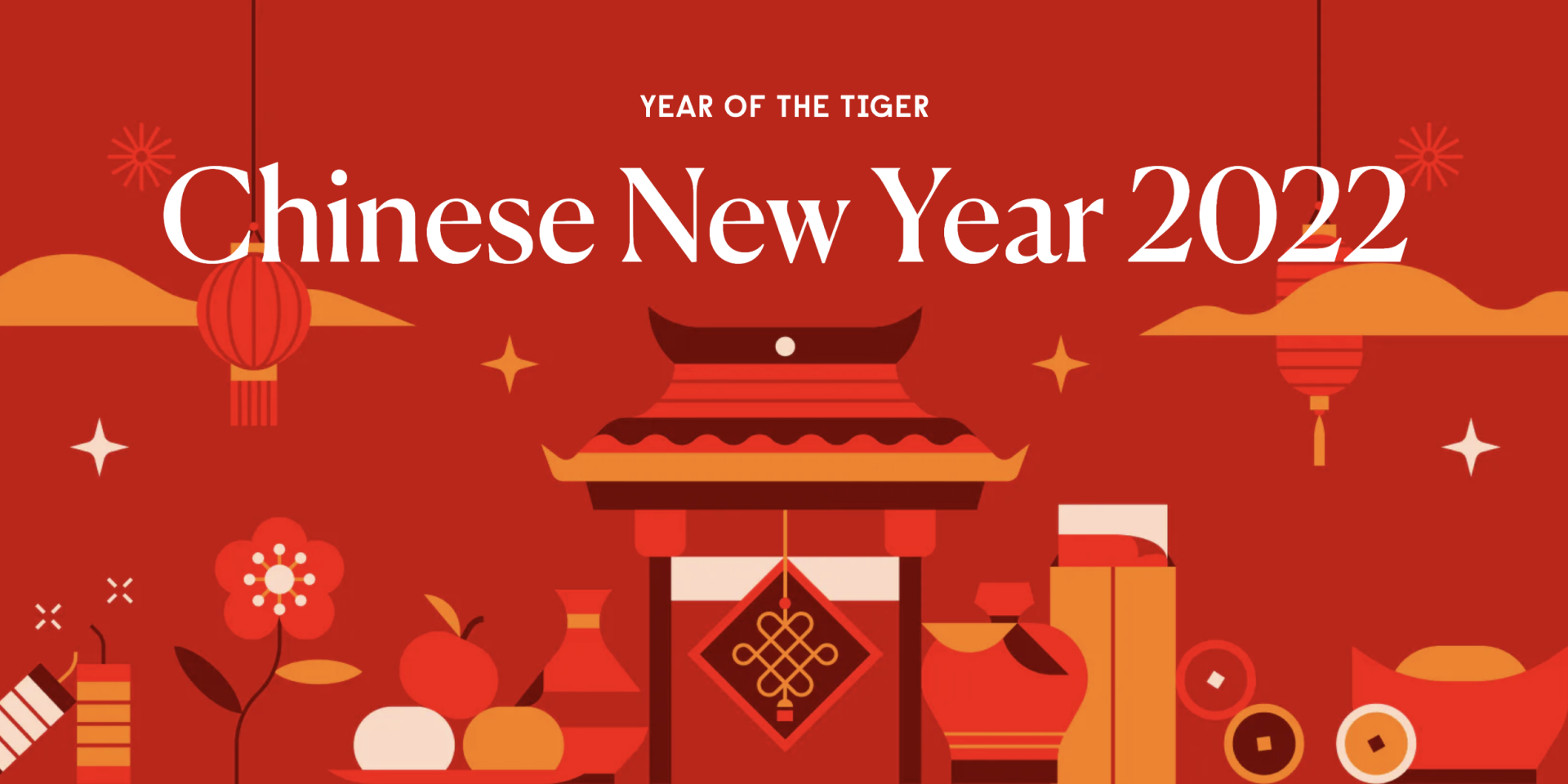 |
| Photo: Chinesenewyear |
The origins of the Chinese New Year festival are thousands of years old and are steeped in legends but it is unclear when the beginning of the year was celebrated before the Qin Dynasty.
A small scale Spring Festival is said to have been celebrated as early as at the time of the legendary sage-emperors Yao and Shun.
Historically, various Chinese dynasties celebrated the Spring Festival in different ways, and at times influenced each other and added certain customs and traditions to it.
The Spring Festival is supposed to have been initiated in the Shang Dynasty (Chinese: 商朝; Pinyin: Shāng cháo) and the custom of ancestor worship was included in the festivities.
During the Western Zhou Dynasty (Chinese: 西周, Pinyin: Xī zhōu), it was custom to begin agriculture on New Year celebration.
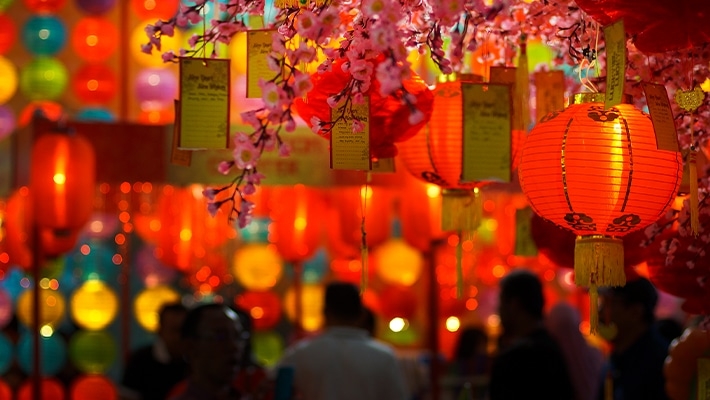 |
| Photo: Shutterstock |
During the Han Dynasty (Chinese: 漢朝; Pinyin: Hàn cháo), the formation of the rituals became popular, including ceremonial gathering and the use of 'fireworks' in the form of burning bamboo started to appear during the celebrations. Due to thermal expansion when bamboo with its cavity is on fire, it bursts and makes a loud bang and hence is regarded as 'early firework'.
During the Cao Wei (Chinese:曹魏; Pinyin: Cáo wèi) and Jin Dynasties (Chinese: 晋朝; Pinyin: Jìn cháo) the practice of shou sui (Chinese: 守岁, Pinyin: shǒusuì, translated: guarding age or guarding the year) became popular as well as the use of firecrackers. Shou sui is the gathering and staying together during the time between the change of the years.
Displaying riddles on lanterns during the Lantern Festival became popular during the Tang Dynasty (Chinese: 唐朝; pinyin: Táng cháo) and solving the riddles on the lanterns is known as caidengmi (traditional Chinese: 猜燈謎; pinyin: cāidēngmí).
In the Song Dynasty (Chinese: 宋朝; Pinyin: Sòng cháo) hollowed bamboo poles firecrackers became loaded with gunpowder. Gunpowder was discovered in China in the Tang Dynasty by Taoist monks-alchemists searching for an elixir of immortality.
Emperor Taizu of the Northern Song Dynasty was presented with the first gunpowder - impregnated fire arrows in 969 AD.
Since the Southern Song Dynasty (Chinese: 南宋; pinyin: Nán sòng) fishermen along the coast of Guangzhou started to establish the tradition of eating the yusheng dish on renri, the 7th day of the Chinese New Year celebration.
Chinese New Year Dates
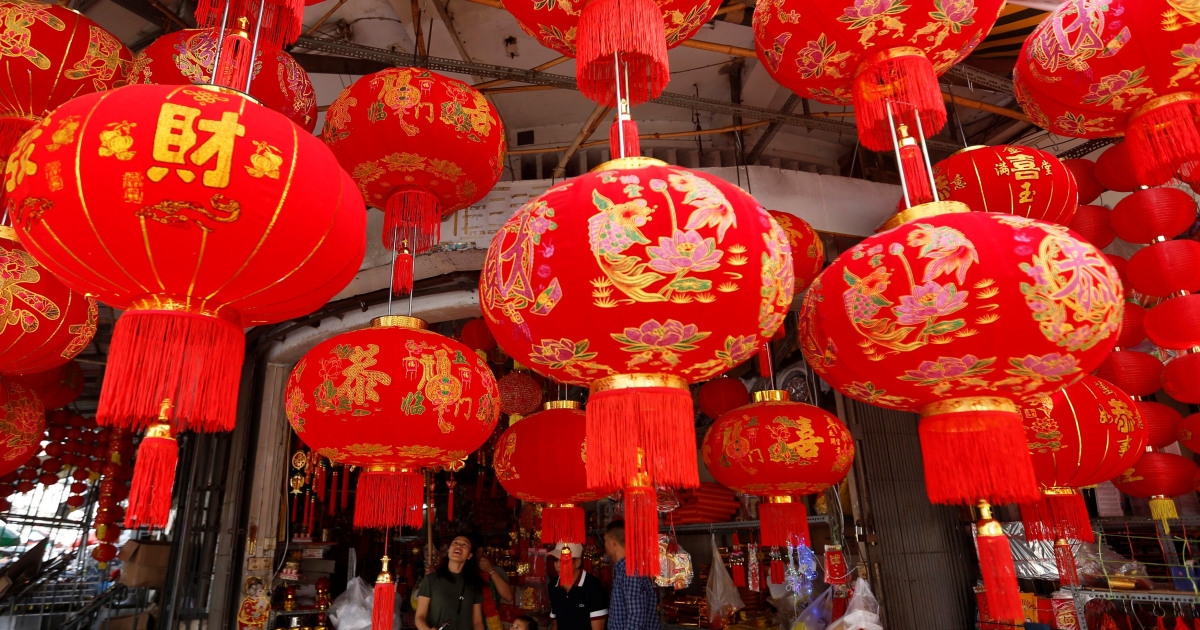 |
| Photo: NBC News |
The date of Chinese New Year is determined by the Chinese lunar calendar. The date changes every year but is always somewhere in the period from January 21st to February 20th.
Chinese New Year 2022 will fall on Tuesday, February 1st, 2022. Read more on Chinese New Year dates from 2022 to 2030.
Chinese New Year Animal: 2022 — Year of the Tiger
Each Chinese year is associated with an animal sign according to the Chinese zodiac cycle, which features 12 animal signs in the order Rat, Ox, Tiger, Rabbit, Dragon, Snake, Horse, Goat, Monkey, Rooster, Dog, Pig.
2022 is the year of the Tiger. The recent and incoming Tiger years are 1950, 1962, 1974, 1986, 1998, 2010, and 2022. If you were born in one of these years, your Chinese zodiac sign is the Tiger.
These zodiac signs always begin on Chinese Lunar New Year's Day, rather than January 1st!
| Gregorian | Date | Animal |
| 2021 | 12 Feb | Ox |
| 2022 | 1 Feb | Tiger |
| 2023 | 22 Jan | Rabbit |
| 2024 | 10 Feb | Dragon |
| 2025 | 29 Jan | Snake |
| 2026 | 17 Feb | Horse |
| 2027 | 6 Feb | Goat |
| 2028 | 26 Jan | Monkey |
| 2029 | 13 Feb | Rooster |
| 2030 | 3 Feb | Dog |
| 2031 | 23 Jan | Pig |
| 2032 | 11 Feb | Rat |
How to celebrate Chinese New Year: Tradtions, Customs, Festivals, Symbols
Chinese New Year celebrations were born out of fear and myth. Legend spoke of the wild beast Nian (which also is the word for “year”) that appeared at the end of each year, attacking and killing villagers. Loud noises and bright lights were used to scare the beast away, and the Chinese New Year celebrations were born. Today, the 15-day New Year festivities are celebrated with a week of vacation in metropolitan areas of China. Much like the Western New Year (January 1st), the biggest celebration is on the eve of the holiday. At the turn of the new year, firework displays are put on throughout the city.
1. Traditions
Aside from New Year’s Eve, there are other important days of the 15-day Chinese New Year Festival, including:
JIE CAI CENG: Welcoming the Gods of Wealth and Prosperity
On the fifth day of New Year’s, it is believed that the gods of prosperity come down from the heavens. Businesses will often participate in setting off firecrackers as they believe it will bring them prosperity and good fortune for their business.
YUAN XIAO JIE: Festival of Lanterns
The 15th day of the New Year is known as the Festival of Lanterns and marks the end of the Chinese New Year celebrations. All types of lanterns are lit throughout the streets and often poems and riddles are often written for entertainment.
There are also paper lanterns on wheels created in the form of either a rabbit or the animal of the year (Dog for 2018). The rabbit lantern stems from a Chinese myth or fairytale about a female goddess named Chang E who jumped onto the moon.
So she wouldn’t travel alone, she brought a rabbit with her to keep her company. It is said that if your heart is pure enough, you can see the goddess Chang E and her rabbit on the moon on this day.
Setting Off Firecrackers and Fireworks
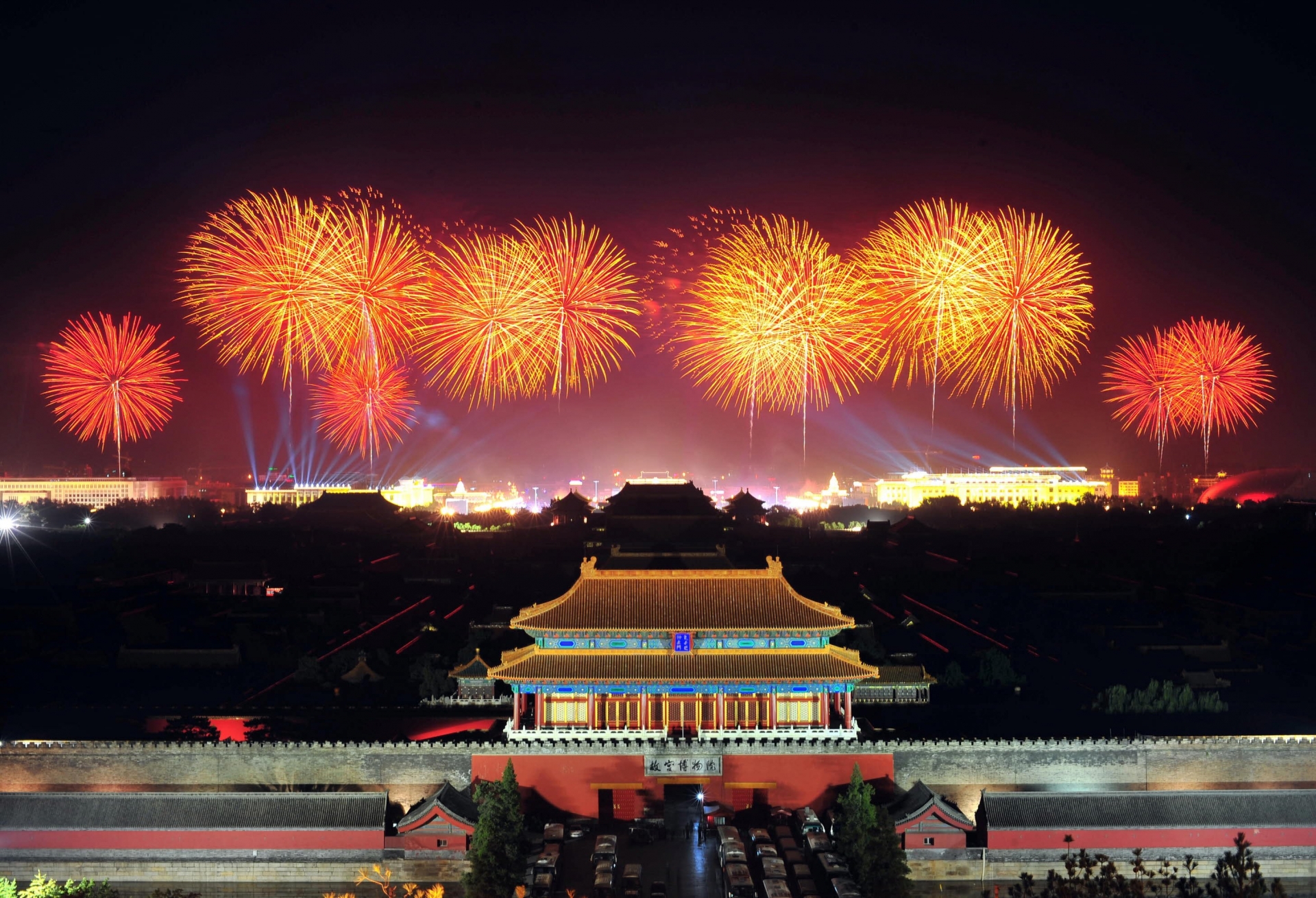 |
| Photo: South China Morning Post |
The moment New Year arrives there is a cacophony of fireworks and firecrackers all around, even in rural China. Families stay up for this joyful moment.
In many rural areas, it's customary to set off firecrackers before dinner, each day from New Year's Eve to day 3 of CNY.
It's believed that the louder the firecrackers, the better and luckier it will be for business and farming in the coming year.
Kids, with (mini) firecrackers in one hand and a lighter in another, cheerfully celebrate by throwing the small explosives one-by-one on the street whilst plugging their ears.
Putting on New Clothes and Extending New Year Greetings
On the first day of New Year, Chinese people put on new clothes, and say "gongxi" (恭喜/gong-sshee/literally ‘respectful joy’, meaning 'greetings' or 'best wishes'), wishing each other good luck and happiness in the New Year.
It is customary for the younger generation to visit their elders, and wish them health and longevity.
In recent years, a new way to do New Year greetings has appeared, especially among the young. People who are too busy to visit their friends or relatives send a New Year's card, a WeChat red envelope, or a text message instead.
Watching Lion and Dragon Dances
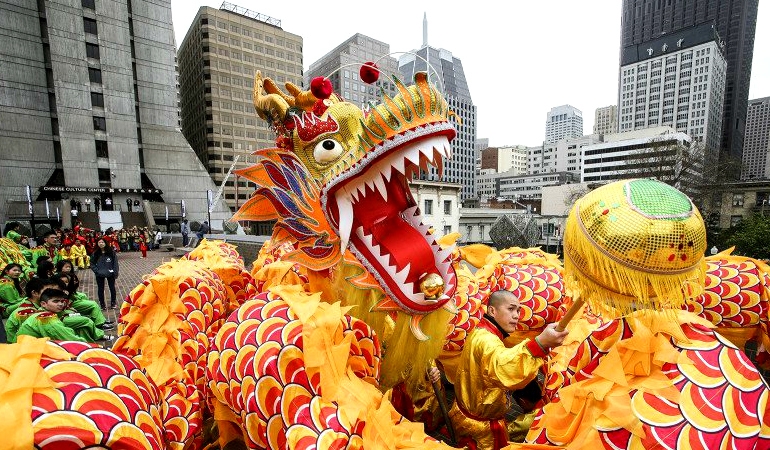 |
| Photo: Chinese American Family |
Lion dances and dragon dances are also seen on New Year's Day. Once very popular in China, they are reappearing in many places. They are more popular in Hong Kong and Macau.
Public Celebrations at Parks and Temple Fairs
Beijing's temple fairs are the places to go for traditional activities in Beijing. Such activities are held in parks from the first day of the lunar year to the last (when celebrating the Lantern Festival).
Generally, parks and temples are the best places to go for festive celebrations at Chinese New Year.
Eating tradtional foods
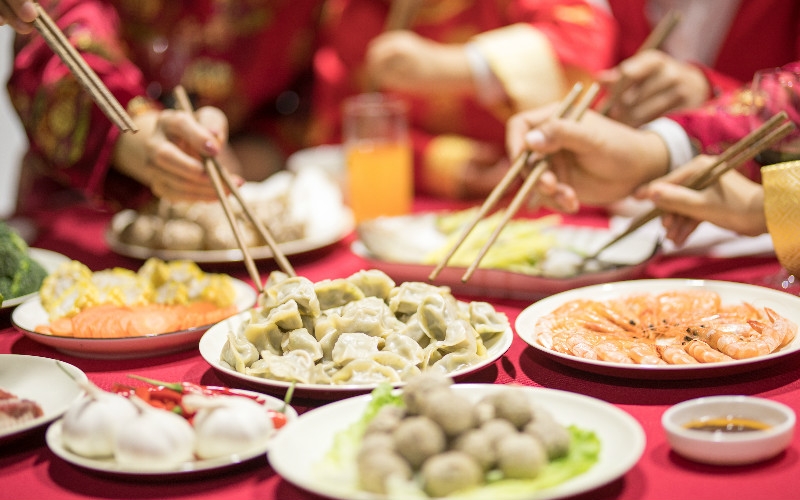 |
| Photo: China Highlights |
A reunion dinner (nián yè fàn) is held on New Year's Eve during which family members gather for a celebration. The venue will usually be in or near the home of the most senior member of the family. The New Year's Eve dinner is very large and sumptuous and traditionally includes dishes of meat (namely, pork and chicken) and fish. Most reunion dinners also feature a communal hot pot as it is believed to signify the coming together of the family members for the meal. Most reunion dinners (particularly in the Southern regions) also prominently feature specialty meats (e.g. wax-cured meats like duck and Chinese sausage) and seafood (e.g. lobster and abalone) that are usually reserved for this and other special occasions during the remainder of the year. In most areas, fish (鱼; 魚; yú) is included, but not eaten completely (and the remainder is stored overnight), as the Chinese phrase "may there be surpluses every year" (年年有余; 年年有餘; niánnián yǒu yú) sounds the same as "let there be fish every year." Eight individual dishes are served to reflect the belief of good fortune associated with the number. If in the previous year a death was experienced in the family, seven dishes are served.
Other traditional foods consists of noodles, fruits, dumplings, spring rolls, and Tangyuan which are also known as sweet rice balls. Each dish served during Chinese New Year represents something special. The noodles used to make longevity noodles are usually very thin, long wheat noodles. These noodles are longer than normal noodles that are usually fried and served on a plate, or boiled and served in a bowl with its broth. Expectedly, the noodles symbolize the wish for a long life. The fruits that are typically selected would be oranges, tangerines, and pomelos as they are round and "golden" color symbolizing fullness and wealth. Their lucky sound when spoken also brings good luck and fortune. The Chinese pronunciation for orange is 橙 (chéng /chnng/), which sounds the same as the Chinese for 'success' (成). One of the ways to spell tangerine(桔 jú /jyoo/) contains the Chinese character for luck (吉 jí /jee/). Pomelos is believed to bring constant prosperity. Pomelo in Chinese (柚 yòu /yo/) sounds similar to 'to have' (有 yǒu), disregarding its tone, however it sounds exactly like 'again' (又 yòu). Dumplings and spring rolls symbolize wealth, whereas sweet rice balls symbolize family togetherness.
2. Symbols
Red envelopes
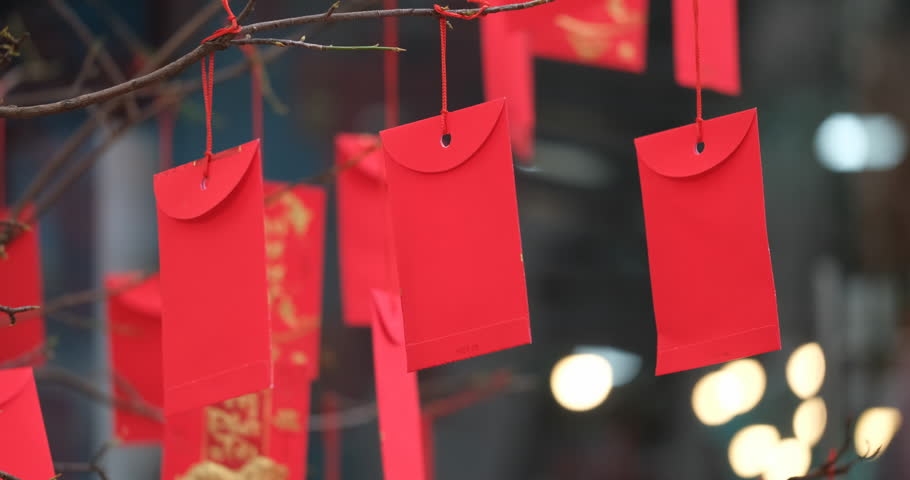 |
| Photo: Shutterstock |
Called “hong bao” in Mandarin, the red envelopes filled with money are typically only given to children or unmarried adults with no job. If you’re single and working and making money, you still have to give the younger ones the hong bao money.
The custom of giving red envelopes originates from some of the oldest stories of Chinese New Year. As the legend goes, there was a demon named Sui that came out to terrify children while they were asleep. To keep children safe from being harmed by Sui, parents would light candles and stay up for the whole night of Chinese New Year’s Eve. The legend goes:
One New Year’s Eve, a child was given eight coins to play with to keep him awake. The child wrapped the coins in red paper, opened the packet, rewrapped it, and reopened it until he was too tired to continue, and fell asleep. Then his parents placed the packet with eight coins under his pillow. When Sui tried to touch his head, the eight coins emitted a strong light and scared the demon away. The eight coins turned out to be eight fairies.
From then on, giving red envelopes became a way to keep children safe and bring good luck.
Chinese New Year red envelopes are a traditional gift for children or elderly people during Chinese New Year. In China, the red envelope (money) is called ya sui qian (压岁钱 /yaa sway chyen/), which means 'suppressing Sui [the demon]money'. Those who receive a red envelope are wished another safe and peaceful year.
Generally, on Chinese New Year’s Eve or New Year's Day, young children and grandchildren give their best wishes to their parents and grandparents. In return, grandparents and parents gift their children and grandchildren red envelopes with money, wishing them good luck in the new year.
Parents and grandparents also receive red envelopes given by their grown-up children/grandchildren as a way of sending them good luck, happiness, and health.
Dragon
The dragon is present in many Chinese cultural celebrations as the Chinese people often think of themselves as descendants of the mythical creature. On the fifth day of the New Year when many people have to start going back to work, they will also have dancing dragons perform in the front of the office building.
On the 15th day of the New Year (Yuan Xiao Jie), they may also have a lot of dancing dragon performances. The dragon represents prosperity, good luck and good fortune.
On auspicious occasions, including Chinese New Year and the opening of shops and residences, festivities often include dancing with dragon puppets. These are "life sized" cloth-and-wood puppets manipulated by a team of people, supporting the dragon with poles. They perform choreographed moves to the accompaniment of drums, drama, and music. They also wore good clothing made of silk.
Chinese New Year Taboos and Superstitions, According to China Highlights
1. Avoid taking medicine.
It is a taboo for a person to brew herbal medicine or take medicine on the first day of the lunar year, otherwise, it is believed he or she will get ill for a whole year.
In some places, after the bell announcing the New Year at midnight New Year's Day, sickly people break their gallipots (medicine pots) in the belief that this custom will drive the illness away in the coming year.
2. Don't sweep or take out garbage.
The act of sweeping on this day is associated with sweeping wealth away. Taking out garbage symbolizes dumping out the good luck or good fortune from the house.
3. No unlucky words.
Nobody wants to hear words with negative meanings during the Lunar New Year period. Avoid saying words related to death, sickness, poverty, ghosts, etc. People replace them with euphemisms if they need to talk about such topics, for example saying“somebody is gone” instead of “somebody died”.
4. Don't eat porridge and meat for breakfast.
Porridge should not be eaten, because it is considered that only poor people have porridge for breakfast, and people don't want to start the year "poor" as this is a bad omen.
Besides, meat should not be eaten at this breakfast out of respect for the (Buddhist) gods (who are believed to be against killing of animals), as all gods are expected to be out meeting and wishing a happy New Year to each other.
5. Avoid washing hair and getting a haircut.
Hair must not be washed on Chinese New Year’s Day. In Mandarin, hair (发, fa) has the same pronunciation (and indeed is the same character) as fa in facai (发财), which means 'to become wealthy’. Therefore, it is seen as not a good thing to “wash one’s fortune away” at the beginning of the New Year.
Avoid cutting hair on this day, as it is believed that it might bring misfortune to uncles.
It is increasingly popular, however, to have a haircut or get a new hairstyle before Chinese New Year for a new look (new ‘wealth’) in the coming year.
6. Don't wash clothes.
People do not wash clothes on the first and second day of the new year, because these two days are celebrated as the birthday of the water god. To wash clothes is regarded as disrespect to the god of water.
The ancients believed that water symbolizes wealth. It is believed that pouring away water after washing clothes invokes a pouring away of wealth.
7. Don't use scissors or knives.
The blades of the scissors are thought to be like sharp lips when people quarrel. Using scissors on the first day of Chinese New Year is perceived as an invocation for quarrels with others in the coming year.
The use of knives is to be avoided for any accident, whether harming a person or tool, is thought to lead to inauspicious things and the depletion of wealth in the coming year.
9. No odd amounts of lucky money.
Don't give an odd amount of money in a red envelope. Chinese people like even numbers, with the traditional belief that good things always come in doubles. But also avoid unlucky numbers such as 4 and 40, as 4 sounds like death in Chinese.
Don't give certain gifts.
Don't give certain gifts, like clocks, scissors, and pears, as they have a bad meaning in Chinese culture. Read more on what not to give at Chinese New Year.
10. Avoid breaking a bowl, plate, glass, etc.
Breaking symbolizes incompleteness and bad luck. Breaking a bowl, plate, glass, vase, or mirror during the Spring Festival is considered a bringer of bad fortune, monetary loss, or family breakup.
If something is broken accidentally, people usually use red paper to wrap up the fragments, and then say "Sui sui ping’an" which means ‘all year round safe and sound’. In Mandarin, 碎 (sui, meaning 'broken') and 岁 (sui, meaning 'year') sound the same.
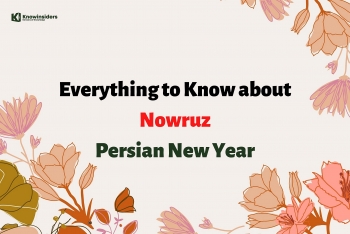 What and How to Celebrate Persian New Year 'Nowruz' What and How to Celebrate Persian New Year 'Nowruz' Nowruz is the Persian New Year celebrated by many countries in the Middle East, Central Asia and those in the Bahá’í faith. Check out this ... |
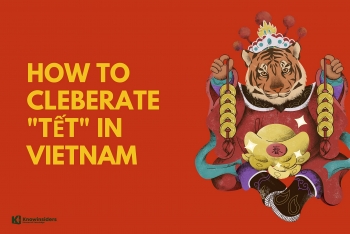 How to Celebrate a Vietnamese New Year's (Tet) How to Celebrate a Vietnamese New Year's (Tet) The lunar new year holiday, known simply as Tết, is the happiest time of year in Vietnam. How to celebrate Vietnamese New Year (Tet)! |
 How to Celebrate New Year Virtually During Covid-19 How to Celebrate New Year Virtually During Covid-19 Check out 7 interesting ideas to celebrate New Year during the Covid-19 pandemic! |
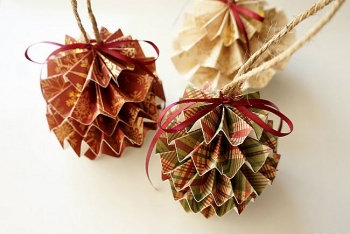 How to Celebrate a Meaningful Christmas Party at Home How to Celebrate a Meaningful Christmas Party at Home Many people will worry that Christmas can be boring when they have to stay at home. But, thanks to these following easy tips, you can ... |

